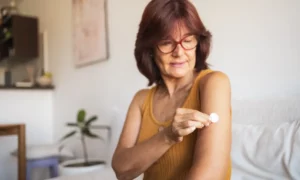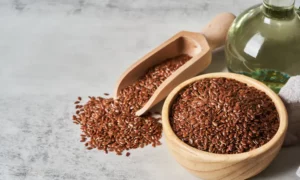Hot flashes, a common experience primarily associated with menopause, can occur in various stages of life and impact individuals differently. Understanding the symptoms is crucial for effective management and improved quality of life. In this article, we will talk about what are hot flashes, the causes causing them, the different conventional approaches, and importantly top natural remedies to help with hot flashes.
Contents
What Are Hot Flashes?
When hot flashes occur, a sudden sensation of heat, accompanied by a red and flushed face as well as sweating, is experienced. The exact cause of hot flashes is not fully understood, but they may be linked to a decrease in estrogen levels and alterations in the part of the brain that regulates body temperature.
During a hot flash, blood vessels near the skin’s surface widen, aiding in the cooling process and leading to perspiration. Some women may also experience a swift heart rate or chills.
When these episodes happen during sleep, they are termed night sweats. Night sweats can disrupt sleep, causing awakenings and difficulties in obtaining sufficient rest.
The term “hot flush” refers to the redness observed in the face and neck during a hot flash.
What Are The Causes Of Hot Flashes?
Hot flashes are primarily caused by hormonal changes, especially a decrease in estrogen levels. The exact mechanisms triggering hot flashes are not fully understood, but they are commonly associated with:
- Menopause
The most common cause of hot flashes is the hormonal changes that occur during menopause. As women age, there is a natural decline in estrogen levels, which can lead to the onset of hot flashes.
The transitional phase leading up to menopause, known as perimenopause, involves fluctuations in hormone levels, including estrogen, contributing to the occurrence of hot flashes.
- Surgical Menopause
Women who undergo surgical removal of the ovaries (oophorectomy) experience an abrupt and significant drop in estrogen levels, which can trigger hot flashes.
- Breast Cancer Treatment
Certain breast cancer treatments, such as hormonal therapies and chemotherapy, can induce menopausal symptoms, including hot flashes.
- Hormonal Disorders
Conditions affecting the endocrine system, such as polycystic ovary syndrome (PCOS) or disorders of the adrenal glands, may disrupt hormonal balance and contribute to hot flashes.
- Medications
Some medications, including certain antidepressants, anti-anxiety drugs, and medications that lower estrogen levels, may be associated with hot flashes as a side effect.
- Thyroid Disorders
Disorders affecting the thyroid, such as hyperthyroidism, can influence the body’s temperature regulation and potentially contribute to hot flashes.
- Smoking
Smoking has been linked to an increased risk of early menopause, potentially leading to the earlier onset and increased severity of hot flashes.
- Weight and Body Composition
Women with a lower body mass index (BMI) or those who have undergone significant weight loss may be more susceptible to hot flashes.
- Stress and Anxiety
Emotional factors, such as stress and anxiety, can trigger or exacerbate hot flashes in some individuals.
While these factors are commonly associated with hot flashes, it’s essential to recognize that the exact cause can vary among individuals.
How Long Do Hot Flashes Last?
The duration of hot flashes can vary widely among individuals. Some women may experience hot flashes for a relatively short period, while others may have them for an extended duration. Here are general patterns of how long hot flashes may last:
- During Menopause Transition
Hot flashes often begin during perimenopause, the transitional phase leading up to menopause. This phase can last several years, typically starting in a woman’s 40s, and hot flashes may occur intermittently during this time. - Menopause Onset
Menopause is considered to have occurred when a woman has gone 12 consecutive months without a menstrual period. Hot flashes may be most frequent and intense during the months leading up to menopause and the first few years after menopause. - Postmenopausal Period
While hot flashes tend to decrease in frequency and intensity over time, some women may continue to experience them for several years after menopause. In some cases, hot flashes may persist into the postmenopausal period. - Individual Variability
The duration and frequency of hot flashes vary widely among individuals. Some women may have occasional, mild hot flashes for only a few years, while others may experience more frequent and intense episodes over a more extended period.
Conventional Treatments For Hot Flashes During Menopause 
It’s important to note that the effectiveness of these treatments can vary from person to person, and it’s always recommended to consult with a healthcare professional for personalized advice. Here are some conventional treatments for hot flashes during menopause:
- Hormone Replacement Therapy (HRT)
HRT involves taking estrogen and, in some cases, progesterone to replace the hormones that decline during menopause. This can effectively reduce hot flashes, but it may not be suitable for everyone. It’s essential to discuss the risks and benefits with a healthcare provider.
- Non-Hormonal Medications
Certain medications, such as selective serotonin reuptake inhibitors (SSRIs) and serotonin-norepinephrine reuptake inhibitors (SNRIs), originally developed to treat depression, have been found to help alleviate hot flashes.
- Gabapentin and Pregabalin
These medications, which are typically used to treat nerve pain, can sometimes be effective in reducing the frequency and severity of hot flashes.
- Clonidine
Originally used to treat high blood pressure, clonidine is useful in reducing hot flashes for some women.
- Lifestyle Modifications
Making certain lifestyle changes can also help manage hot flashes. These may include avoiding triggers like spicy foods, caffeine, and alcohol. Maintaining a cool environment, dressing in layers, and using fans can also provide relief.
- Regular Exercise
Engaging in regular physical activity has been shown to reduce the frequency and intensity of hot flashes. It’s important to choose activities that you enjoy and can maintain consistently.
- Mind-Body Techniques
Practices such as yoga, meditation, and deep breathing exercises can help manage stress and reduce the impact of hot flashes.
Drawbacks Of Conventional Treatments
While conventional treatments for hot flashes during menopause can be effective for many women, they also come with certain drawbacks and potential risks. It’s important to be aware of these drawbacks when considering treatment options. Here are some common drawbacks associated with conventional treatments:
- Hormone Replacement Therapy (HRT) Risks
- HRT, which involves taking estrogen and, in some cases, progesterone, may increase the risk of certain health conditions. This includes an elevated risk of breast cancer, blood clots, stroke, and heart disease. The decision to use HRT should be individualized and based on a thorough assessment of the woman’s health history and risks.
- Side Effects of Medications
- Non-hormonal medications, such as SSRIs, SNRIs, gabapentin, and pregabalin, can have side effects. These may include nausea, dizziness, fatigue, and changes in mood. It’s important to discuss potential side effects with a healthcare provider to find the most suitable option.
- Clonidine Side Effects
- Clonidine, while effective for some women, can cause side effects such as dizziness, dry mouth, and fatigue. It may not be well-tolerated by everyone.
- Individual Variability
- The effectiveness of treatments can vary widely among individuals. What works well for one woman may not be as effective for another. Finding the right treatment often involves a process of trial and error.
- Limited Long-Term Safety Data
- Some treatments, especially newer medications or alternative therapies, may lack long-term safety data. The long-term effects of certain treatments may not be fully understood.
- Cost and Accessibility
- Some treatments, especially prescription medications, can be costly. Accessibility to certain therapies may be limited, particularly for individuals without adequate health insurance coverage.
- Dependency on Medications
- Some women may become dependent on medications to manage their symptoms. Dependency raises concerns about long-term use and potential withdrawal effects.
Natural Remedies To Help With Hot Flashes 
Many women explore natural remedies to help manage hot flashes during menopause. While these approaches may not work for everyone, some women find relief from their symptoms through these methods. It’s important to note that the effectiveness of natural remedies can vary, and consulting with a healthcare professional before trying any new treatment is advisable. Here are some natural remedies that some women find helpful for managing hot flashes:
Herbal Supplements
- Black Cohosh: This herb is commonly used to alleviate menopausal symptoms, including hot flashes. However, its effectiveness is still under study, and individual responses may vary.
- Red Clover: Another herbal remedy believed to have estrogen-like effects, red clover may help some women manage hot flashes.
Flaxseed
- Flaxseed contains compounds called lignans, which may have estrogen-like effects. Incorporating ground flaxseed into the diet is thought by some to help reduce the frequency and intensity of hot flashes.
Soy Products
- Foods rich in soy, such as tofu and soy milk, contain plant-based compounds called phytoestrogens. Phytoestrogens are believed to have estrogen-like effects and may help alleviate hot flashes for some women.
Vitamin E
- Some studies suggest that vitamin E supplements may help reduce hot flashes. However, the evidence is not conclusive, and high doses of vitamin E can have risks, so it’s important to consult with a healthcare provider before taking supplements.
Mind-Body Techniques
- Practices such as yoga, meditation, and deep breathing exercises may help manage stress and reduce the impact of hot flashes.
Acupuncture
- Acupuncture involves the insertion of thin needles into specific points of the body. Some women report a reduction in hot flashes after undergoing acupuncture treatments.
Cooling Techniques
- Keeping the body cool can help manage hot flashes. This includes dressing in layers, using fans, and staying in well-ventilated spaces.
Regular Exercise
- Engaging in regular physical activity has been shown to reduce the frequency and intensity of hot flashes. Exercise also provides other health benefits.
Healthy Diet
- Maintaining a balanced and healthy diet can contribute to overall well-being. Avoiding triggers like spicy foods, caffeine, and alcohol may help some women manage hot flashes.
Hydration
- Staying well-hydrated is important, and some women find that sipping cool water throughout the day can help alleviate hot flashes.
It’s crucial to approach natural remedies with caution and discuss their use with a healthcare provider. Natural remedies may interact with medications or have contraindications for certain health conditions. Additionally, what works for one person may not work for another, so it may involve some trial and error to find the most effective approach for managing hot flashes naturally.
Conclusion
In conclusion, exploring natural remedies to help with hot flashes provides individuals with a range of options to enhance their well-being. From herbal supplements to mind-body techniques, the holistic approach presented in this article empowers individuals to take an active role in managing their symptoms. It’s important to recognize that what works for one person may not work for another, highlighting the value of personalized care and professional guidance.
If you are facing menopause related issues, menopause treatment at HerMantra can help. Book your free trial online menopause treatment session now.




